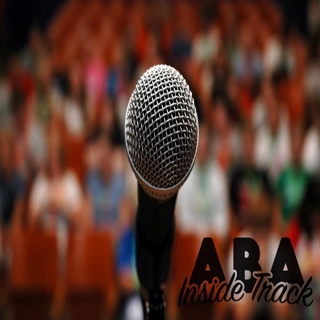
Episode 79 (LIVE) - Teaching to Tact at TACT
ABA Inside Track is coming at ya LIVE with a very special episode recorded at TACT (The Autism Community Therapists) all on the subject of….well…tacts. And this week's articles aren't messing around when it comes to using mands and echoics to beef up your tact training protocols. Plus, binkles for everybody! Articles discussed this episode: Carroll, R.J., & Hesse, B.E. (1987). The effects of alternating mand and tact training on the acquisition of tacts. The Analysis of Verbal Behavior, 5, 55-65. PMCID: PMC2748455 Kodak, T. & Clements, A. (2009). Acquisition of mands and tacts with concurrent echoic training. Journal of Applied Behavior Analysis, 42, 839-843. doi: 10.1901/jaba.2009.42-839 Arntzen, E. & Almas, I.K. (2002). Effects of mand-tact versus tact-only training on the acquisition of tacts. Journal of Applied Behavior Analysis, 35, 419-422. doi: 10.1901/jaba.2002.35-419 If you're interested in ordering CEs for listening to this episode, click here to go to the store page. You'll need to enter your name, BCBA #, and the two episode secret code words to complete the purchase. Email us at abainsidetrack@gmail.com for further assistance.
20 Mars 20191h 20min

Episode 78 - Should Behavior Analysts Use Social Thinking? w/ Dr. Justin Leaf
While many of you may have heard of Michelle Garcia Winner's Social Thinking curriculum, have you ever wondered if it's appropriate for behavior analysts to use it? Well, Dr. Justin Leaf certainly has and he joins us on the podcast to share all of his thoughts on the subject including whether Social Thinking is empirically supported, whether it should be categorized as scientific or pseudoscientific, and whether behavior analysts may be at risk of violating our ethical code for using it. Articles discussed this episode: Leaf, J.B., Townley-Cochran, D., Taubman, M., Cihon, J.H., Oppenheim-Leaf, M.L., Kassardjian, A., Leaf, R., McEachin, J., & Pentz, T.G. (2015). The teaching interaction procedure and behavioral skills training for individuals diagnosed with autism spectrum disorder: a Review and commentary. Review Journal of Autism and Developmental Disorders, 2, 402-413. doi: 10.1007/s40489-015-0060-y Leaf, J.B., Kassardjian, A., Oppenheim-Leaf, M.L, Cihon, J.H., Taubman, M., Leaf, R., & McEachin, J. (2016). Social Thinking: Science, pseudoscience, or antiscience? Behavior Analysis in Practice, 9, 152-157. doi: 10.1007/s40617-016-0108-1 Leaf, J.B., Kassardjian, A., Oppenheim-Leaf, M.L., Cihon, J.H., Taubman, M., Leaf, R., & McEachin, J. (2016). Erratum to: Social Thinking: Science, pseudoscience, or antiscience? Behavior Analysis in Practice, 9, 158-159. doi: 10.1007/s40617-016-0119-y Crooke, P.J. & Winner, M.G. (2016). Social Thinking methodology: Evidence-based or empirically supported? A response to Leaf et al. (2016). Behavior Analysis in Practice, 9, 403-408. doi: 10.1007/s40617-016-0151-y Crooke, P.J., Hendrix, R.E., & Rachman, J.Y. (2008). Brief report: Measuring the effectiveness of teaching Social Thinking to children with Asperger syndrom (AS) and high functioning autism (HFA). Journal of Autism and Developmental Disorders, 38, 581-591. doi: 10.1007/s10803-007-0466-1 If you're interested in ordering CEs for listening to this episode, click here to go to the store page. You'll need to enter your name, BCBA #, and the two episode secret code words to complete the purchase. Email us at abainsidetrack@gmail.com for further assistance.
13 Mars 20191h 12min

March 2019 Preview
It's another exciting month here at ABA Inside Track. Not only do we have two amazing guests lined up to review their research, but we also have a recording from one of our recent live shows. But, before all of that, we review some follow-up from last month's episodes in errata and take a few moments to celebrate our THIRD YEAR of podcasting! Interested in applying for a job in an area in desperate need for ABA services? Autism Compassion Africa is looking to expand their team. Check out the posting here for more information. And feel free to listen to our interview with co-founder Whitney Hammel to learn more about ACA Articles for February 2019 Should Behavior Analysis Use Social Thinking? w/ Dr. Justin Leaf Leaf, J.B., Townley-Cochran, D., Taubman, M., Cihon, J.H., Oppenheim-Leaf, M.L., Kassardjian, A., Leaf, R., McEachin, J., & Pentz, T.G. (2015). The teaching interaction procedure and behavioral skills training for individuals diagnosed with autism spectrum disorder: a Review and commentary. Review Journal of Autism and Developmental Disorders, 2, 402-413. doi: 10.1007/s40489-015-0060-y Leaf, J.B., Kassardjian, A., Oppenheim-Leaf, M.L, Cihon, J.H., Taubman, M., Leaf, R., & McEachin, J. (2016). Social Thinking: Science, pseudoscience, or antiscience? Behavior Analysis in Practice, 9, 152-157. doi: 10.1007/s40617-016-0108-1 Leaf, J.B., Kassardjian, A., Oppenheim-Leaf, M.L., Cihon, J.H., Taubman, M., Leaf, R., & McEachin, J. (2016). Erratum to: Social Thinking: Science, pseudoscience, or antiscience? Behavior Analysis in Practice, 9, 158-159. doi: 10.1007/s40617-016-0119-y Crooke, P.J. & Winner, M.G. (2016). Social Thinking methodology: Evidence-based or empirically supported? A response to Leaf et al. (2016). Behavior Analysis in Practice, 9, 403-408. doi: 10.1007/s40617-016-0151-y Crooke, P.J., Hendrix, R.E., & Rachman, J.Y. (2008). Brief report: Measuring the effectiveness of teaching Social Thinking to children with Asperger syndrom (AS) and high functioning autism (HFA). Journal of Autism and Developmental Disorders, 38, 581-591. doi: 10.1007/s10803-007-0466-1 Teaching Tacts at TACT (LIVE) Carroll, R.J., & Hesse, B.E. (1987). The effects of alternating mand and tact training on the acquisition of tacts. The Analysis of Verbal Behavior, 5, 55-65. PMCID: PMC2748455 Kodak, T. & Clements, A. (2009). Acquisition of mands and tacts with concurrent echoic training. Journal of Applied Behavior Analysis, 42, 839-843. doi: 10.1901/jaba.2009.42-839 Arntzen, E. & Almas, I.K. (2002). Effects of mand-tact versus tact-only training on the acquisition of tacts. Journal of Applied Behavior Analysis, 35, 419-422. doi: 10.1901/jaba.2002.35-419 Instructive Feedback w/ Dr. Jason Vladescu Vladescu, J.C. & Kodak, T.M. (2013). Increasing instructional efficiency by presenting additional stimuli in learning trials for children with autism spectrum disorders. Journal of Applied Behavior Analysis, 46, 805-816. doi: 10.1002/jaba.70 Haq, S.S., Zemantic, P.K., Kodak, T., LeBlanc,B., & Ruppert, T.E. (2017). Examination of variables that affect the efficacy of instructive feedback. Behavioral Interventions, 32, 206-216. doi: 10.1002/bin.1470 Dass, T.K., Kisamore, A.N., Vladescu, J.C., Reeve, K.F., Reeve, S.A., & Taylor-Santa, C. (2018). Teaching children with autism spectrum disorder to tact olfactory stimuli. Journal of Applied Behavior Analysis, 51, 538-552. doi: 10.1002/jaba.470
6 Mars 201921min

Episode 77 - Public Speaking
May I have your attention, please? Webster's dictionary defines public speaking as the act of speaking in front of an audience. And it's sort of terrifying…and I'm sweating just standing here talking to you. Now my PowerPoint slides have malfunctioned and I've dropped my notes. And I'm picturing the audience naked which is making me feel very uncomfortable. If only I'd listened to that amazing podcast about public speaking and how to improve my own abilities before agreeing to speak in front of all the best behavior analysts. Save me, ABA Inside Track! Articles discussed this episode: Friman, P.C. (2014). Behavior analysts to the front! A 15-step tutorial on public speaking. The Behavior Analyst, 37, 109-118. doi: 10.1007/s40614-014-0009-y Fawcett, S.B. & Miller, L.K. (1975). Training public-speaking behavior: An experimental analysis and social validation. Journal of Applied Behavior Analysis, 8, 125-135. doi: 10.1901/jaba.1975.8-125 Black, E.L. & Martin. G.L. (1980). A component analysis of public-speaking behaviors across individuals and behavioral categories. Communication Education, 29, 273-282. doi: 10.1080/03634528009378425 If you're interested in ordering CEs for listening to this episode, click here to go to the store page. You'll need to enter your name, BCBA #, and the two episode secret code words to complete the purchase. Email us at abainsidetrack@gmail.com for further assistance.
27 Feb 20191h 22min

Episode 76 - Gamification
What began as Rob's excuse to talk about his favorite Mario games turned into a long discussion of research about gamification and its role (if any) in improving human behavior. We review the literature, the theory, and the anecdotes around this hot hot trend in every field from education to environmentalism. Is gamification the Fortnite of productivity? Or should it be tossed in a landfill like E.T. for Atari 2600. Articles discussed this episode: Morford, Z.H., Witts, B.N., Killingsworth, K.J., & Alavosius, M.P. (2014). Gamification: The intersection between behavior analysis and game design technologies. The Behavior Analyst, 37, 25-40. doi: 10.1007/s40614-014-0006-1 Sailer, M., Hense, J.U., Mayr, S.K., & Mandi, H. (2017). How gamification motivates: An experimental study of the effects of specific game design elements on psychological need satisfaction. Computers in Human Behavior, 69, 371-380. doi: 10.1016/j.chb.2016.12.033 Hamari, J., Koivisto, & Sarsa, H. (2014). Does Gamification Work? A literature review of empirical studies on gamification. Proceedings of the Annual Hawaii International Conference on Systems Sciences. doi: 10.1109/HICSS.2014.377 Fogel, V.A., Miltenberger, R.G., Graves, R., & Koehler, S. (2010). The effects of exergaming on physical activity among inactive children in a physical education classroom. Journal of Applied Behavior Anlaysis, 43, 591-600. doi: 10.1901/jaba.2010.43-591 If you're interested in ordering CEs for listening to this episode, click here to go to the store page. You'll need to enter your name, BCBA #, and the two episode secret code words to complete the purchase. Email us at abainsidetrack@gmail.com for further assistance.
20 Feb 20191h 13min

Episode 75 - Acceptance and Commitment Therapy w/ Dr. Adam Hahs
In a world where individuals with mental health needs are struggling, could acceptance and commitment training be the answer? We chat with Dr. Adam Hahs to learn all about this third-wave behavior therapy, its procedure, the research, and exactly how the phrase "milk, milk, milk" could help parents with autism. Articles discussed this episode: Harris, R. (2006). Embracing your demons: an Overview of Acceptance and Commitment Therapy. Psychotherapy in Australia, 12, 2-8. Gould, E.R., Tarbox, J., & Coyne, L. (2018). Evaluating the effects of Acceptance and Commitment Training on the overt behavior of parents of children with autism. Journal of Contextual Behavioral Science, 7, 81-88. doi: 10.1016/j.jcbs.2017.06.003 Hahs, A.D., Dixon, M.R., & Paliliunas, D. (in press). Randomized controlled trial of a brief acceptance and commitment training for parents of individuals diagnosed with autism spectrum disorders. Journal of Contextual Behavioral Science. doi: 10.1016/j.jcbs.2018.03.002 If you're interested in ordering CEs for listening to this episode, click here to go to the store page. You'll need to enter your name, BCBA #, and the two episode secret code words to complete the purchase. Email us at abainsidetrack@gmail.com for further assistance.
13 Feb 20191h 15min

February 2019 Preview
While it might be the shortest month of the year, ABA Inside Track is running long on exciting content. Switching up our preview format a bit, we're here to tell you everything coming up in the ENTIRE MONTH! That's right: Three full-length episodes in a row! We'll be talking about acceptance and commitment training with our special guest, Dr. Adam Hahs, before discussing two outside-of-the-box topics with gamification and public speaking. Rob's hours of editing behavior analytic journal review is your gain! Also, if you're looking for a fun conference in leadership, tickets are now available for the Behavior Analyst Leadership Conference (BALC), coming to Connecticut at the end of March! *Note: Due to a camera SNAFU, we're audio only this month. We'll have our video back up for the next preview. Sorry about that! Articles for February 2019: Acceptance and Commitment Training Harris, R. (2006). Embracing your demons: an Overview of Acceptance and Commitment Therapy. Psychotherapy in Australia, 12, 2-8. Gould, E.R., Tarbox, J., & Coyne, L. (2018). Evaluating the effects of Acceptance and Commitment Training on the overt behavior of parents of children with autism. Journal of Contextual Behavioral Science, 7, 81-88. doi: 10.1016/j.jcbs.2017.06.003 Hahs, A.D., Dixon, M.R., & Paliliunas, D. (in press). Randomized controlled trial of a brief acceptance and commitment training for parents of individuals diagnosed with autism spectrum disorders. Journal of Contextual Behavioral Science. doi: 10.1016/j.jcbs.2018.03.002 Gamification Morford, Z.H., Witts, B.N., Killingsworth, K.J., & Alavosius, M.P. (2014). Gamification: The intersection between behavior analysis and game design technologies. The Behavior Analyst, 37, 25-40. doi: 10.1007/s40614-014-0006-1 Sailer, M., Hense, J.U., Mayr, S.K., & Mandi, H. (2017). How gamification motivates: An experimental study of the effects of specific game design elements on psychological need satisfaction. Computers in Human Behavior, 69, 371-380. doi: 10.1016/j.chb.2016.12.033 Hamari, J., Koivisto, & Sarsa, H. (2014). Does Gamification Work? A literature review of empirical studies on gamification. Proceedings of the Annual Hawaii International Conference on Systems Sciences. doi: 10.1109/HICSS.2014.377 Fogel, V.A., Miltenberger, R.G., Graves, R., & Koehler, S. (2010). The effects of exergaming on physical activity among inactive children in a physical education classroom. Journal of Applied Behavior Anlaysis, 43, 591-600. doi: 10.1901/jaba.2010.43-591 Public Speaking Friman, P.C. (2014). Behavior analysts to the front! A 15-step tutorial on public speaking. The Behavior Analyst, 37, 109-118. doi: 10.1007/s40614-014-0009-y Fawcett, S.B. & Miller, L.K. (1975). Training public-speaking behavior: An experimental analysis and social validation. Journal of Applied Behavior Analysis, 8, 125-135. doi: 10.1901/jaba.1975.8-125 Black, E.L. & Martin. G.L. (1980). A component analysis of public-speaking behaviors across individuals and behavioral categories. Communication Education, 29, 273-282. doi: 10.1080/03634528009378425
6 Feb 201923min

Episode 74 - Joint Attention
It's a belated birthday episode for Diana! In her honor we're talking about joint attention, one of the primary deficits noted in most children with autism. This week we discuss what joint attention is, which treatments are effective for improving responses and initiation to joint attention, and how a trip to Uncle Moe's Family Feedbag might be the ideal environment to master the skill. Happy birthday, Diana! Articles discussed this episode: Taylor, B.A. & Hoch, H. (2008). Teaching children with autism to respond to and initiate bids for joint attention. Journal of Applied Behavior Analysis, 41, 377-391. doi: 10.1901/jaba.2008.41-377 Klein, J.L., MacDonald, R.F.P, Vaillancourt, G., Ahearn, W.H., & Dube, W.V. (2009). Teaching discrimination of adult gaze direction to children with autism. Research in Autism Spectrum Disorder, 3, 42-49. doi: 10.1016/j.rasd.2008.03.006 Isaksen, J. & Holth, P. (2009). An operant approach to teaching joint attention skills to children with autism. Behavioral Interventions, 24, 215-236. doi: 10.1002/bin.292 If you're interested in ordering CEs for listening to this episode, click here to go to the store page. You'll need to enter your name, BCBA #, and the two episode secret code words to complete the purchase. Email us at abainsidetrack@gmail.com for further assistance.
30 Jan 20191h 19min






















